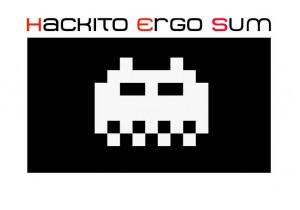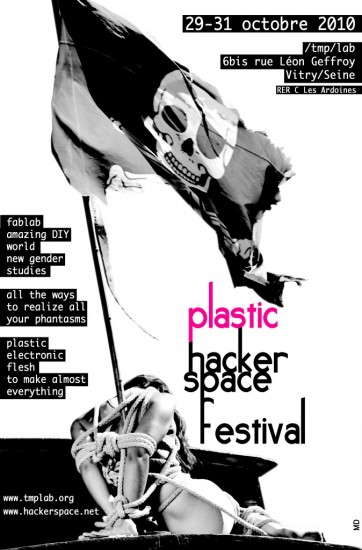 Hackito Ergo Sum 2010 :
Hackito Ergo Sum 2010 :
http://hackitoergosum.org
Hackito Ergo Sum conference will be held from April 8th to 10th 2010 in Paris, France.
It is part of the series of conference “Hacker Space Fest” taking place since 2008 in France and all over Europe.
HES2010 will focus on hardcore computer security, insecurity, vulnerability analysis, reverse engineering, research and hacking.
INTRO
The goal of this conference is to promote security research, broaden public awareness and create an open forum so that communication between the researcher, the security industry, the experts and the public can happen.
A recent decision of justice in France has convicted a security researcher for disclosing vulnerabilities and exploits. These laws (similar to the one in Germany), descending from USA’s DMCA law, are orienting freedom of research and knowledge into a situation where “illegal knowledge” can happen, restricted to the only ones blessed by governmental silent approval and military. Scientific research and public information cannot be made into another monopoly of state, where “some” can study and publish and “some others” cannot.
Such approach just show how misinformed some politics are and how little understanding they get of the struggle they are acting in.
Not understanding that the best way to improve security is to attack it shows the lack of maturity of some stakeholder by being cut out of independent information sources.
This is where our ethics and responsibility is to say “No, we have a right for free information and true independence in research”, and this responsibility is the one of anybody, not just the responsibility of academically blessed scientists.
This conference will try to take in account all voices in order to reach a balanced position regarding research and security, inviting businesses, governmental actors, researchers, professionals and general public to share concerns, approaches and interests during.
During three days, research conferences, solutions presentations, panels and debates will aim at finding synthetic and balanced solutions to the current situation.
CONTENT
> Research Track:
We are expecting submissions in english or french, english preferred.
The format will be 45 mn presentation + 10mn Q&A.
For the research track, preference will be given for offensive, innovative and highly technical proposals covering (but not restricted to) the topics below:
Attacking Software
* Vulnerability discovery (and automating it!)
* Non-x86 exploitation
* Fuzzing with SMT and its limits
* New classes of software vulnerabilities and new methods to detect software bugs (source or binary based)
* Reverse Engineering tools and techniques
* Static analysis (source or binary, Lattices to blind analysis, new languages and targets strongly encouraged)
* Unpacking
* Current exploitation on Gnu/Linux WITH GRsecurity / SElinux / OpenWall / SSP and other current protection methods
* Kernel land exploits (new architectures or remote only)
* New advances in Attack frameworks and automation
Attacking Infrastructures
* Exotic Network Attacks
* Telecom (from VoIP to SS7 to GSM & 3G RF hacks)
* Financial and Banking institutions
* SCADA and the industrial world, applied.
* Governmental firewall and their limits (Australia, French’s HADOPI, China, Iran, Danemark, Germany, …)
* Satellites, Military, Intelligence data collection backbones (“I hacked Echelon and I would like to share”)
* Non-IP (SNA, ISO, make us dream…)
* Red-light and other public utilities control networks
* M2M
Attacking Hardware
* Hardware reverse engineering (and exploitation + backdooring)
* Femto-cell hacking (3G, LTE, …)
* Microchip grinding, opening, imaging and reverse engineering
* BIOS and otherwise low-level exploitation vectors
* Real-world SMM usage! We know it’s vulnerable, now let’s do something
* WiFi drivers and System on Chip (SoC) overflow, exploitation and backdooring.
* Gnu Radio hacking applied to new domains
* Toll-booth and fast-lane payment systems
Attacking Crypto
* Practical crypto attacks from the hackers perspective (RCE, bruteforce, …)
* SAT-solver applied to cryptanalysis
* Algorithm strength modeling and evaluation metrics
* Hashing functions pre-image attacks
* Crypto where you wouldn’t think there is
We highly encourage any other presentation topic that we may not even imagine.
Required informations:
* Presenter’s name
* Bio
* Presentation Title
* Description
* Demo?
* Needs: Internet? Others?
* Company (name) or Independent?
* Address
* Phone
* Email
Send your submission to:
hes2010-cfp __AT__ lists.hackitoergosum.org
> Business & Society Track:
Format:
20 minutes slots to present a tool, an innovative product, a solution (commercial, open source, free); a customer experience or open research domain; a society issue or a subject of public interest.
Demos are mandatory for tool, product or solutions presentations.
Pure-marketing presentation will be moderated (i.e. interrupted).
Follow-up with private group can be arranged for in-depth demo or analysis.
Submission needs to be sent to:
hes2010-cfp __AT__ lists.hackitoergosum.org
> Other interests
If you want to organize a Capture The Flag, Reverse Engineering contest, Lockpicking contest or any other activity during the conference, you are most welcome. Please contact us at: [email protected]
DATES
2010-01-18 Call for Paper
2010-03-01 Submission Deadline
2010-04-08 Start of conference
2010-04-10 End of conference
PROGRAMMING COMMITTEE
The submissions will be reviewed by the following programming committee:
* Sebastien Bourdeauducq (Milkymist, /tmp/lab, BEC)
* Rodrigo Branco “BSDaemon” (Coseinc)
* Jonathan Brossard (P1 Code Security, DNSlab)
* Emmanuel Gadaix (TSTF)
* Laurent Gaffié (Stratsec)
* Thomas Garnier (Microsoft)
* The Grugq (PSP)
* Dhillon Kannabhiran (HITB)
* Kostya Kortchinsky (Immunity)
* Itzik Kotler (Radware)
* Philippe Langlois (P1 Telecom Security, PSP, TSTF, /tmp/lab)
* Moxie Marlinspike (Institute for Disruptive Studies)
* Karsten Nohl (deGate, Reflextor)
* Nicolas Thill (OpenWRT, /tmp/lab)
* Julien Tinnes (Google)
* Nicolas Ruff (EADS, Security Labs)
* Carlos Sarraute (CORE Security Technologies)
* Matthieu Suiche (Sandman, win32dd)
* Fyodor Yarochkin (TSTF, o0o.nu)
FEES
Business-ticket 120 EUR
Public entrance 80 EUR
Reduction for Students below 26 40 EUR
Reduction for CVE publisher or exploit publisher in 2009/2010 40 EUR
Entrance fees and sponsors fees will be used to fund international speakers travel costs.
VOLUNTEERS
Volunteers who sign up before 2010-03-01 get free access and will need to be present onsite two days before (2010-04-06) if no further arrangement is made with the organization.
SPONSORS
Sponsors are welcome to contact us to receive the Partnership Kit at:
hes2010-orga __AT__ lists.hackitoergosum.org
LOCATION
Paris, France.
CONTACT




